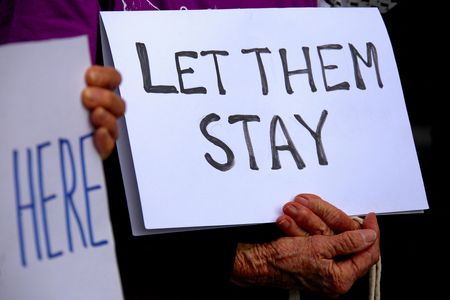By Benoit Van Overstraeten and Francesco Guarascio
STRASBOURG (Reuters) -The European Union’s chief executive on Wednesday proposed a phased oil embargo on Russia, as well as sanctions on its top bank and to ban Russian broadcasters from European airwaves, in its toughest measures yet to punish Moscow for its war in Ukraine.
The plan, if agreed by EU governments, would be a watershed for the world’s largest trading bloc, which is dependent on Russian energy and must find alternative supplies.
But Russia’s invasion of Ukraine by land, sea and air on Feb. 24, the renewed Russian offensive in eastern Ukraine and the horrific images of slaughter in Ukrainian towns have overcome reluctance to deliver sanctions that are painful for the EU as well as for Russia.
Reflecting widespread anger in the West at Russian President Vladimir Putin’s campaign – which Moscow says is a “special military operation” to defeat dangerous nationalists – the head of the EU executive said Moscow must face consequences.
“Putin must pay a price, a high price, for his brutal aggression,” European Commission President Ursula von der Leyen told the European Parliament in Strasbourg.
“Today, we will propose to ban all Russian oil from Europe,” she said to applause in the chamber.
The Commission’s measures include phasing out supplies of Russian crude oil within six months and refined products by the end of 2022. Von der Leyen pledged to minimise the impact on European economies.
The price of Brent crude rose around 3% to more than $108 a barrel in early trade.
If agreed, the embargo would follow the United States and Britain, which have already imposed bans to cut one of the largest income streams to the Russian economy, as the West buys more than half of its crude and petroleum products from Russia.
“We are addressing our dependency on Russian oil. And let’s be clear, it will not be easy because some member states are strongly dependent on Russian oil, but we simply have to do it,” she said.
Ambassadors from the EU’s 27 governments are expected to adopt the Commission proposals as early as this week, allowing them to become law soon after.
RISKY BET
Less reliant on pipelines, oil can be shipped from other sources and the EU hopes its gradual approach will avoid an oil shock. Diplomats also told Reuters that Hungary and Slovakia could be exempt from the embargo until the end of 2023, due to their high dependency on Russian energy.
Simone Tagliapietra of the Brussels-based Bruegel think-tank said the EU’s gradual embargo on Russian oil was still risky.
“In the short term it might leave Russian revenues high while implying negative consequences for the EU and the global economy in terms of higher prices – not to mention retaliation risks (by Russia) on natural gas supplies,” he said.
Apart from oil, the latest round of sanctions proposes hitting Sberbank, Russia’s top lender, adding it to several banks that have already been excluded from the SWIFT messaging system.
“We de-SWIFT Sberbank – by far Russia’s largest bank, and two other major banks. By that, we hit banks that are systemically critical to the Russian financial system and Putin’s ability to wage destruction,” von der Leyen said.
“This will solidify the complete isolation of the Russian financial sector from the global system,” she said.
Sberbank did not immediately respond to a request for comment. The lender, which exited almost all its European markets in early March, has previously said that other rounds of sanctions would not have a significant impact on its operations.
Von der Leyen said more high-ranking Russian military officials would face EU asset freezes and travel bans, without giving names. “You are not getting away with this,” she said, referring to the Kremlin.
State-owned Russian broadcasters RTR-Planeta and R24 are among those proposed to be shut out of European airwaves, diplomats said, although von der Leyen did not give details in her address to parliament.
The EU’s chief executive also proposed a recovery plan for Ukraine once the conflict ends, saying there was a need for hundreds of billions of euros in funding to rebuild the country.
“Eventually, it will pave the way for Ukraine’s future inside the European Union,” von der Leyen said.
(Additional reporting John Chalmers, Sabine Siebold, Jan Strupczewski, Gabriela Bacyznska and Kate AbnettWriting by Robin Emmott, Editing by John Chalmers and Barbara Lewis)












